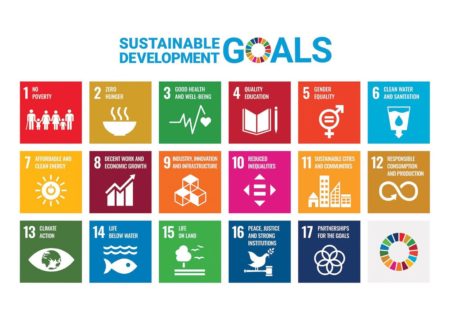Frequently Asked Questions
Introduction to the UN Sustainable Development Goals
The Sustainable Development Goals (or SDGs), adopted by the United Nations in 2015, are a universal call to action to end poverty, protect the planet, and ensure that by 2030 all people enjoy peace and prosperity. All 193 members of the United Nations are signatories of the SDGs.
The SDG framework includes 17 goals, 169 targets and 232 indicators which integrated recognizing that actions in one area affect outcomes in others, and that development must balance social, economic, and environmental sustainability.

The 2030 Agenda was developed as a 15-year global plan of action with the 17 SDGs at its core. As a signatory of the SDGs and the 2030 Agenda, Canada has developed a plan for advancing the SDGs. In Canada, the 2030 Agenda National Strategy was developed through a national engagement process which found that a number of organizations, businesses and individuals were already actively using and engaging with the SDGs. It also identified key priority areas to support further advancement of the global 2030 Agenda, including:
- Leadership, governance and policy coherence;
- Awareness, engagement and partnership;
- Accountability, transparency and reporting;
- Reconciliation, and;
- Investment in SDG programs and work.
The SDGs are a universal framework for developing a peaceful, prosperous and just world. This means that all people in all sectors can take action to advance the goals, and in turn, working toward these goals will benefit everyone, especially the most vulnerable. The SDGs represent a shared understanding of the challenges we face globally and how they can be addressed.
While the SDGs are a UN developed framework, they reflect a global consultation process that engaged over 8 million people and reflects the issues and challenges facing their communities.
The SDGs are a broad global framework for sustainable development that aim to connect planning, implementation and monitoring of progress around the world. While the SDGs were developed and ratified by countries, realizing their ambitious outcome by 2030 requires local action across sectors.
The process of SDG localization involves developing local solutions to meet the goals and interpreting the targets and indicators that underpin the SDGs to measure progress at the community level. Locally, working to advance the SDGs can create important common ground between those working on different issues and in different sectors. Community engagement and cross-sector collaboration are critical activities that support localization.
How are the SDGs activated?
As an individual, you can learn about the SDG framework to better understand goals themselves and how they relate to one another. Taking direct action on the SDGs could mean doing your part to reduce consumption, conserve energy, water and other resources or donate your time and money to help others. The SDGs can also be a tool to help citizens and communities hold businesses, government and themselves accountable to support sustainable development.
SDG 11, Sustainable Cities and Communities underscores the importance of local action in achieving the SDGs. However, all SDGs have important local dimensions. Local governments can align planning, funding and service delivery to the SDGs, while also ensuring that local metrics and reporting match SDG reporting at the national and international level. Some cities have formalized their SDG localization efforts by completing Voluntary Local Reviews (VLRs). VLRs are data-driven projects conducted by cities to better understand where the community stands in relation to the SDGs.
Some of the world’s largest businesses have been working to align with the SDGs, regularly reporting on their progress towards the goals. Small and medium sized businesses also have a role to play advancing the SDGs as they develop and adapt new business models, design new technologies and put local innovations into practice. Social enterprises and other purpose driven businesses can leverage the SDGs by connecting business goals to the broader social, and environmental outcomes outlined in the SDGs.
Research has an important role to play in advancing the SDGs, helping to evaluate new policies, develop and test new measurement frameworks and adapt models to support sustainable development around the world. Locally, SDG related research can be leveraged to understand local challenges, promote practical solutions, and engage the community.
Youth voices and perspectives are critical to achieving the SDGs. Youth-led action on the SDGs can inspire creative solutions and bring them to life. By actively engaging in work to advance the SDGs, youth can be involved in the decisions that affect their lives, now and into the future. Engaging youth on work related to the SDGs can also help demonstrate how positive steps are and can be taken to address complex global challenges.
Funders can leverage the SDGs by aligning grant making and community programming with the SDGs and educating donors about the SDGs. In addition to funding work aligned with the SDGs, funders can support community organizations to build capacity to advance the SDGs by helping to frame local challenges and priorities, support communications, and facilitate collective progress reporting.
Want to be a part of SDG Cities?
Learn more about the SDGs by visiting the Public Library to check out a curated list of local, national and international SDG resources.
Join our growing community on Mighty Networks to connect with other citizens interested in sustainable development in your community.
Already using the SDGs? Get in touch with us to share your SDG story! We regularly publish new SDG stories and case studies from different sectors on our website.
Learn more about and sign up to join the SDG Cities Academy, our cohort-based training program providing education and practical tools for SDG localization across sectors. Our first SDG Cities Academy cohort will be designed for non-profits.
Attend an upcoming SDG Cities Community Learning Series to explore different SDG topics and meet others working to advance the SDGs locally.
Get in touch with us about new Research Partnerships to support localization of the SDGs in Guelph and London.

